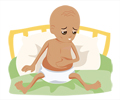
It said the "unprecedented collapse in living standards" can be attributed to high inflation and weak earnings growth in the aftermath of a deep recession.
But it also says that reforms proposed by the coalition government would raise absolute child poverty -- where the household income is below 60 percent of the 2010-11 median income, adjusted for inflation -- by 200,000 in 2015-16 and and 300,000 in 2020-21.
Ministers want to replace all means-tested welfare benefits for those of a working age by a single benefit known as the universal credit.
The IFS report says that in isolation this change would cut child poverty, but this would be more than offset by other reforms, including indexing benefits to a measure of inflation that excludes housing costs.
It forecasts that 3.1 million children, or just over 23 percent, of children in Britain will be in absolute poverty by 2013, up from 2.5 million (19.3 percent) in 2010, and 3.1 million will still be in absolute poverty in 2020.
Advertisement
However, a spokeswoman for the Department for Work and Pensions challenged the report, saying it did not fully take into account all the work the government was doing to tackle child poverty, including in education.
Advertisement
Source-AFP











